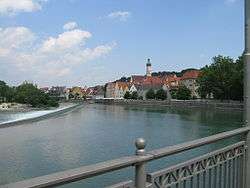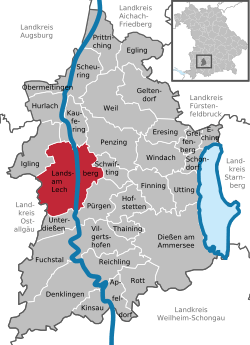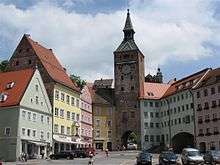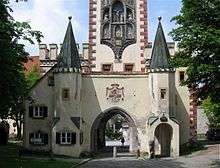Landsberg am Lech
Landsberg am Lech (Landsberg on the river Lech) is a town in southwest Bavaria, Germany, about 65 kilometers west of Munich and 35 kilometers south of Augsburg. It is the capital of the district of Landsberg am Lech.
Landsberg am Lech | |
|---|---|
 The Lech in Landsberg | |
 Coat of arms | |
Location of Landsberg am Lech within Landsberg am Lech district  | |
 Landsberg am Lech  Landsberg am Lech | |
| Coordinates: 48°02′52″N 10°53′56″E | |
| Country | Germany |
| State | Bavaria |
| Admin. region | Oberbayern |
| District | Landsberg am Lech |
| Subdivisions | 6 Ortsteile |
| Government | |
| • Lord Mayor | Mathias Neuner (CSU) |
| Area | |
| • Total | 57.89 km2 (22.35 sq mi) |
| Highest elevation | 630 m (2,070 ft) |
| Lowest elevation | 585 m (1,919 ft) |
| Population (2018-12-31)[1] | |
| • Total | 29,132 |
| • Density | 500/km2 (1,300/sq mi) |
| Time zone | CET/CEST (UTC+1/+2) |
| Postal codes | 86899 |
| Dialling codes | 08191 08246 (Ellighofen) |
| Vehicle registration | LL |
| Website | www.landsberg.de |
Overview


Landsberg is situated on the Romantic Road and is the center of the Lechrain region, the boundary region between Swabia and Bavaria. It is noted for its picturesque historic center.
Landsberg am Lech developed where a major historic salt road crossed over the Lech. To protect the bridge, Duke Henry the Lion ordered a castle to be built, Castrum Landespurch, incorporating an older settlement and castle named Phetine. Soon a greater settlement evolved, which received its town charter as early as the 13th century.
In 1315, the town burned down, but was rebuilt because of its important location. In 1320, Landsberg was permitted to collect salt duties, bringing considerable wealth to the town. In 1419, a river tax added a further source of income.
The town is noted for its prison where Adolf Hitler was incarcerated in 1924. During this incarceration Hitler wrote/dictated his book Mein Kampf together with Rudolf Hess. His cell, number 7, became part of the Nazi cult and many followers came to visit it during the German Nazi-period. Landsberg am Lech was also known as the town of the Hitler Youth.[2]
In the outskirts of this town existed the largest concentration camp in Germany during the Nazi rule, where over 30,000 victims were imprisoned under inhuman conditions, resulting in the death of around 14,500 of them.
Following World War II it was the location for one of the largest Displaced Person (DP) camps for Jewish refugees and the place of execution for more than 150 war criminals after 1945.[3]
It is the birthplace of the Nobel laureate Erwin Neher.

Geography
Town areas
The town comprises three main areas. The historic old town centre of Landsberg, which lies between the river Lech and its easterly elevated bank. The area to the west of the Lech (Katharinenvorstadt, Neuerpfting, Weststadt, Schwaighofsiedlung – today by far the biggest part of the town) and the area on the easterly elevated bank (Bayervorstadt) developed since the early 19th century.
Also belonging to Landsberg are the hamlets of Sandau and Pössing as well as the former independent boroughs of Ellighofen, Erpfting (with Friedheim, Geratshof and Mittelstetten), Pitzling (with Pöring) and Reisch (with Thalhofen).
Landsberg Concentration Camp and displaced person camp
The Landsberg camp began as a Nazi concentration camp. By October 1944, there were more than 5,000 prisoners in the camp.
The camp was liberated on April 27, 1945, by the 12th Armored Division of the United States Army. Upon orders from General Taylor, the American forces allowed news media to record the atrocities, and ordered local German civilians and guards to reflect upon the dead and bury them bare-handed. After the liberation of the camp it became a displaced person (DP) camp, primarily for Jewish refugees from the Soviet Union and the Baltic states.
A dramatization of the discovery and liberation of the camp was presented in Episode 9: Why We Fight of the Band of Brothers mini-series.[4]
The camp closed on October 15, 1950.
In December 2019, Israeli academic and translator Ilana Hammerman wrote of the difficulties she encountered in trying to visit the site of the camp and to find the memorial to the victims. She noted that "[f]or decades after the war, local residents and the authorities endeavored to ignore its existence and consign it to oblivion".[5] Since 1983 Anton Posset and the association called Landsberg im 20. Jahrhundert are working on the commemoration this part of history and established based on donations the European Holocaust Memorial on the former concentration camp Kaufering VII.[6]
Notable people
- Samuel Bak (b. 1933), Artist
- Johnny Cash (1932–2003), American singer/songwriter stationed here in the early 1950s while serving in the U.S. Air Force
- Sir Hubert von Herkomer (1849–1914), Artist, film and theatre director
- Adolf Hitler (1889–1945), German dictator (was in prison in Landsberg 1923/24)
- Ignaz Kögler (1680–1746), Jesuit missionary and mathematician
- Lanspergius (1489–1539), Carthusian monk and ascetical writer
- Julian Nagelsmann (b. 1987), Football manager
- Erwin Neher (b. 1944), Biologist
- Anton Posset (1941–2015), Holocaust researcher and founder of the European Holocaust Memorial located in Landsberg
- Siegfried Rauch (1932–2018), Film and television actor
- George Remus (1878–1952), Attorney and famed bootlegger during U.S. Prohibition. Known as "The King of the Bootleggers."
- Luise Rinser (1911–2002), German Writer and politician
- Wilhelm Ritter von Leeb (1876–1956), World War II field marshal and war criminal
- Michael Unterbuchner (b. 1988), Darts player
- Alois Wolfmüller (1864–1948), German inventor and aeronautical engineer
- Dominikus Zimmermann (1685–1766), Architect
Twin towns - sister cities
Landsberg am Lech is twinned with:[7]






Sports
Landsberg is home to the following sports clubs:
| Club | Sport | League | Established |
|---|---|---|---|
| TSV Landsberg | Football | Landesliga Bayern | 1882 |
| Landsberg Riverkings | Ice hockey | Regionalliga (Bayernliga) | 2008 |
| Landsberg X-PRESS | American Football | Regionalliga Süd | 2007 |
| DJK Landsberg | Basketball | Regionalliga | 1956 |
| Jahn Landsberg | Football | A-Klasse Oberbayern | 1923 |
| Türkspor Landsberg | Football | A-Klasse Oberbayern | -- |
| Landsberg Cruisaders | Baseball | Bezirksliga Bayern | 2003 |
| Landsberg Kodiacs | Softball | Landesliga Bayern | 2009 |
| Landsberg BB-Dance Camp | Dance | Boogie Woogie Dance Festival | 1987 |
Sources
- Burgett, Daniel R. (2001). Beyond the Rhine. New York: Dell Publishing. pp. 119–134.
- Thomas Raithel, Die Strafanstalt Landsberg am Lech und der Spöttinger Friedhof (1944-1958). Eine Dokumentation im Auftrag des Instituts für Zeitgeschichte München-Berlin (München: Oldenbourg 2009).
References
- "Fortschreibung des Bevölkerungsstandes". Bayerisches Landesamt für Statistik und Datenverarbeitung (in German). July 2019.
- Landsberg - the City of the Youth during WWII article by Anton Posset and the Citizens´Association "Landsberg in the 20th Century", see also Citizens´Association European Holocaust Memorial Foundation: „Landsberg: The City of Youth
- The future began at DP-Camp Landsberg article by Anton Posset. See also:This article traces the origin and history of the DP-camp Landsberg between 1945 and 1952.
- Original movie of the U.S. Army: liberation of the concentration camp Kaufering IV (by Landsberg Lech), in April 1945: This film and the photos, made by the U.S. Army, served as a template for Part 9 "Band of Brothers" given from the archive of Anton Posset to the film team.
- Hammerman, Ilana (6 December 2019). "A Picturesque Bavarian Town Shows That Germany Isn't Confronting Its Nazi Past". Haaretz. Retrieved 6 December 2019.
- English Homepage of the Association: Bürgervereingung Landsberg im 20. Jahrhundert zur Erfoschung der Landsberger Zeitgeschichte
- "Partnerstädte". landsberg.de (in German). Landsberg am Lech. Retrieved 2019-11-27.
External links
| Wikimedia Commons has media related to Landsberg am Lech. |
- Official Website (in German)
- European Holocaust Memorial Citizens´Association European Holocaust Memorial Foundation
- The Holocaust in the Landsberg area - Citizens´ Association "Landsberg in the 20th Century" (English)
- Landsberger lager-cajtung (Landsberg am Lech, Germany) is a digitized periodical at the Leo Baeck Institute, New York